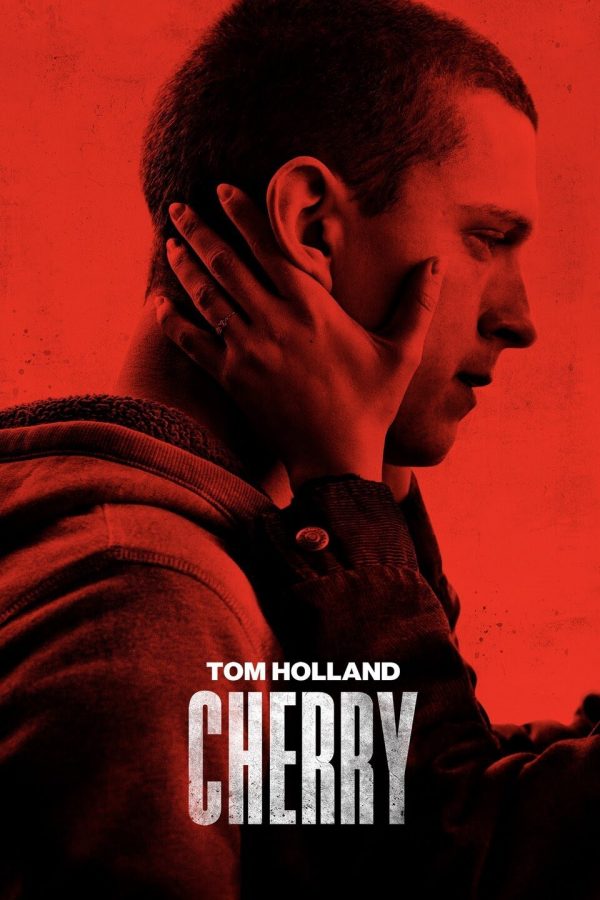The Russo Brothers’ Newest, “Cherry”
March 30, 2021
“Cherry,” an Apple TV+ original, was released on February 26 and has already received major traction. The film is based on a 2018 debut novel written by Nico Walker and serves to be one of the quickest book to film adaptation turnarounds within the recent media trend.
Directed by Anthony and Joe Russo, famous for their participation in the Marvel Cinematic Universe for multi-billion-dollar films such as “Avengers: Infinity War” and “Avengers: Endgame”, the film is a big change. It also features Tom Holland in the main role, likely recruited from his role in the Russo’s films as Peter Parker, AKA Spider-Man.
The movie features an unnamed narrator (Tom Holland) throughout many significant times in his life, from college dropout to war veteran. His only anchor is his college girlfriend, Emily (Ciara Bravo) as he experiences PTSD, drug addiction, crime, and more. The character sets out to represent the millions affected by the American opioid epidemic in recent years, and is also largely based on Walker’s own life, hence the lack of title.
Despite this, from the beginning, the more obvious distinction in “Cherry” is its formatting. As mentioned previously, Holland’s character serves as a narrator of the story and speaks directly to the camera on several occasions, a feat successfully accomplished by a select few. It is also split into five different sections, making the movie almost episodic in nature. The uniqueness of its presentation definitely pushed boundaries for narrative telling, but in a way that seemed meaningful or served a purpose rather than for the sake of boundary-pushing in itself to gain publicity.
Each section change comes with glaringly obvious tonal shifts, and its sharp contrast shows the intensity of the main character’s life developments. Everything seems different, and it’s all made in the details such as the performances, costumes, camera lenses, music and more. The first introductory segment is mellow in its story-telling, showing the character often referred to as Cherry as a college student and falling in love with Emily for the first time. But it also includes several stylistic choices that seem chaotic in a distracting and borderline unpleasant way. For example, there is loud opera music that overtakes the dialogue in a scene in which Emily walks away from Holland’s character in a bar, which seems intensely exaggerated and almost intrusive in the audience’s ability to follow the plot. However, this all plays into the seamless cohesiveness of the film as a whole brilliantly. The climax of the film features opera music again, this time over a slow-motion scene of Cherry turning himself in after one last heroin injection. Although the technique of slowing down a seemingly simple scene is often overdone, cheesy, and frankly boring, when matched with the once jarring opera and the culmination of all the high-intensity bank robberies directly before, it seems perfectly done. In hindsight, the beginning of the movie seems like an intentionally messy blend of several meaningful elements throughout the other sections.
Along with its rocky beginning, the film’s conclusion is its shining star. Including the aforementioned slow-motion operatic scene, the last twelve minutes of “Cherry” includes almost no dialogue, except for a single “Thank you very much” from the narrator. A continuous horizontal line shot follows 15 years of the character and is able to evoke meaning and emotion, as well as wrap up all loose ends with solely its magnificent cinematography and impassioned acting.
In fact, it is Holland’s acting that makes the film’s ambitious narrative successful. Although still working with the directors of his breakout role, this movie offered him challenges he had never been faced with before. Holland, only 24 years old, has quite obviously been trying to preemptively avoid his typecast as the young and nerdy superhero. He achieved great success through his starring role as Arvin Russell in Netflix’s “The Devil All The Time” in 2020, featuring other names such as Robert Pattinson, Sebastian Stan, Bill Skarsgard, and more. The movie gave many viewers the belief that Holland had the potential to be a real dramatic actor, but “Cherry” was his chance to solidify this view. He undoubtedly succeeded and was able to stay in his character, while also so blatantly displaying how each life-changing event changed his behavior. Particularly for a film that was so heavily reliant on a single unnamed role, Holland’s ability to accomplish both the sympathy-inducing vulnerability and cold ruggedness of his character made “Cherry” what it was.


